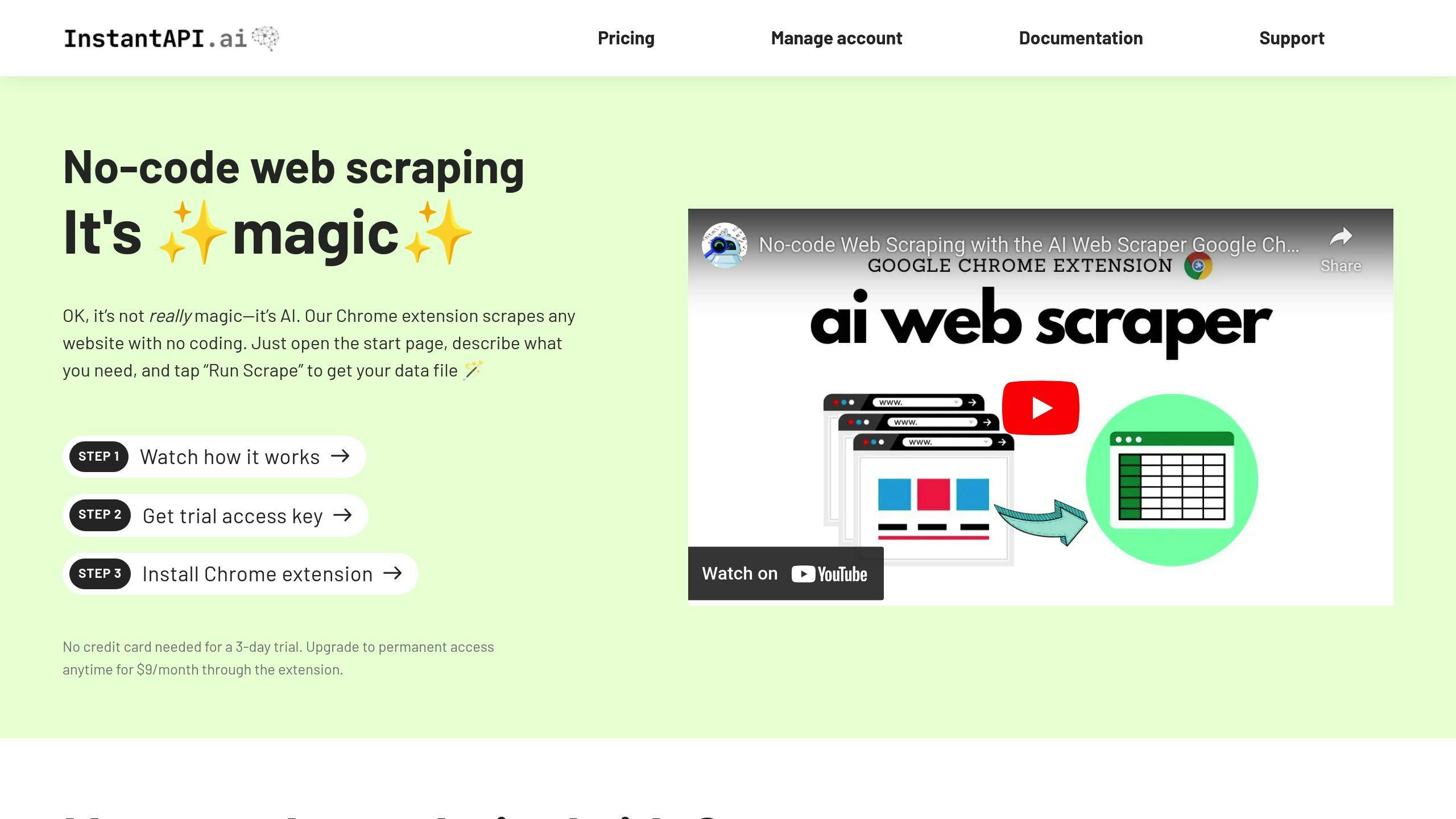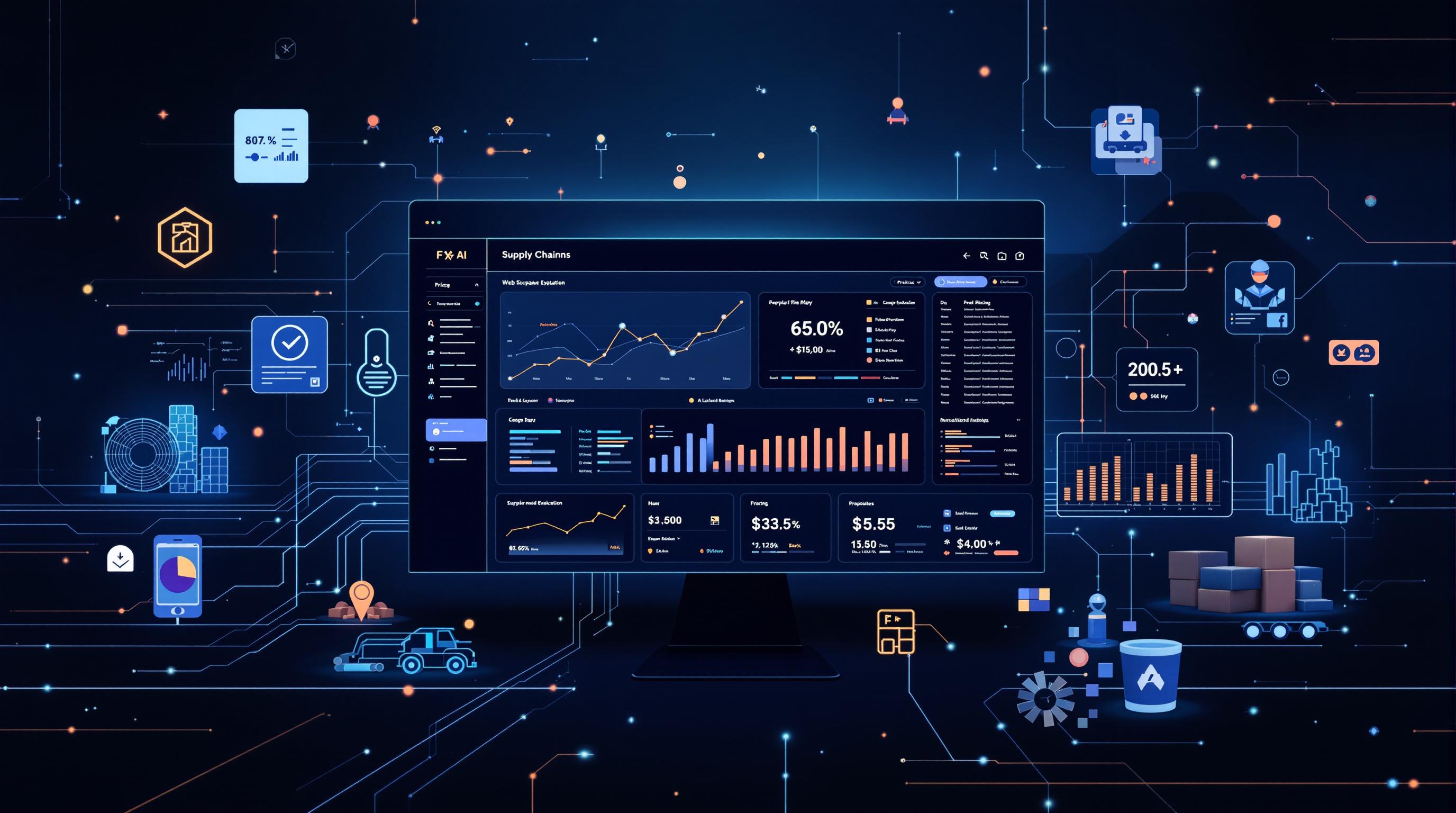CAPTCHAs are designed to block bots, but modern AI tools can solve them with high accuracy. Whether you're dealing with image-based challenges like reCAPTCHAv2 or behavioral systems like reCAPTCHAv3, AI offers solutions to bypass these barriers efficiently. Here's what you need to know:
- AI Strategies: Tools use image recognition, pattern analysis, and human-like behavior simulation to solve CAPTCHAs.
- APIs for Automation: Services like CapSolver, ScrapFly, and Crawlbase simplify CAPTCHA-solving with success rates over 90%.
- Ethical Use: Always comply with website terms, privacy laws, and ethical guidelines when using these tools.
| Service | Key Features | Best For |
|---|---|---|
| CapSolver | Image recognition, browser tools | High-volume scraping |
| Crawlbase | No-code API solution | Enterprise use cases |
| ScrapFly | Proxy integration, fast solving | Research and testing |
AI makes CAPTCHA handling easier, but responsible and legal use is critical. Read on to learn more about the tools, methods, and ethical considerations for CAPTCHA-solving.
Understanding CAPTCHA and Anti-Bot Systems
What CAPTCHA Is and How It Works
CAPTCHA, short for Completely Automated Public Turing test to tell Computers and Humans Apart, is a tool websites use to block automated bots. These systems come in several formats, with the most common being image-based and text-based challenges.
| CAPTCHA Type | Challenge Format | Common Applications |
|---|---|---|
| Image-based | Identifying objects in photos | reCAPTCHAv2 |
| Text-based | Reading distorted characters | Classic CAPTCHA |
| Audio | Interpreting sounds | Accessibility option |
| Behavioral | Analyzing user interactions | reCAPTCHAv3 |
How CAPTCHA Challenges Automation
CAPTCHA makes it tough for bots by requiring tasks that demand advanced visual processing, tracking user behavior (like how a mouse is moved or clicks are made), and examining browser data such as fingerprints and history. These hurdles highlight why AI has become essential for bypassing CAPTCHA and other anti-bot defenses.
How AI Helps Solve CAPTCHAs
AI has made huge strides in breaking CAPTCHA barriers by using tools like advanced recognition systems, pattern analysis, and behavior simulation. For instance, researchers have shown that AI can solve reCAPTCHAv2 challenges with near-perfect accuracy through machine learning.
Here’s how AI tackles these challenges:
- Advanced Image Recognition: Machine learning models can now analyze and interpret images with high precision, identifying objects and patterns in CAPTCHA tasks.
- Pattern Analysis: AI learns from CAPTCHA designs, enabling it to adapt and solve new variations quickly.
- Behavioral Mimicry: By imitating human-like actions, modern AI tools make it harder for CAPTCHA systems to tell bots apart from real users.
AI-Based Methods for Handling CAPTCHA and Anti-Bot Systems
Tackling Image and Text CAPTCHAs
Deep learning models, especially Convolutional Neural Networks (CNNs), are trained on extensive datasets to solve visual and text-based CAPTCHAs with precision. These models can handle tasks like identifying traffic lights, vehicles, or crosswalks in CAPTCHAs, often achieving recognition rates over 95%. This makes them highly effective in cracking challenges like reCAPTCHAv2.
While these models focus on visual and text recognition, some anti-bot systems rely on detecting unnatural user behavior. That’s where behavioral mimicry steps in.
Simulating Human Behavior
AI systems now replicate human-like interactions to bypass behavioral anti-bot defenses. By studying real user actions, these tools generate realistic mouse movements, typing patterns, and scrolling behaviors that closely resemble those of genuine users. Machine learning models process large datasets of human interactions, enabling them to create highly convincing simulations.
If building custom AI solutions sounds complex, CAPTCHA-solving APIs offer a simpler, ready-to-use option.
CAPTCHA-Solving APIs
CAPTCHA-solving APIs have become a go-to solution for efficient web scraping. Services like ScrapFly and CapSolver boast success rates between 92-95%, with solve times under 12 seconds. These APIs integrate smoothly into web scraping workflows, using advanced algorithms and proxy rotation to handle CAPTCHAs effectively - all while adhering to website policies and privacy standards.
How to Bypass/Solve reCAPTCHA v2 & v3 with CapSolver When Web Scraping
sbb-itb-f2fbbd7
AI Tools for CAPTCHA and Anti-Bot Handling
AI-powered tools have changed the way CAPTCHA challenges and anti-bot systems are managed. By using methods like image recognition and mimicking human behavior, these tools make CAPTCHA handling more efficient and effective.
Using InstantAPI.ai

InstantAPI.ai simplifies dynamic webpage scraping with features like AI-driven scraping, premium proxies, and JavaScript rendering. It automatically navigates CAPTCHA challenges without requiring extra setup. Plus, it offers flexible pricing plans, starting with a free tier.
Building Custom AI Models for CAPTCHA
Creating custom AI models provides a tailored approach to solving CAPTCHA challenges. These models often rely on advanced architectures like CNNs (Convolutional Neural Networks). Here’s a breakdown of the process:
| Phase | Description |
|---|---|
| Data Collection | Collecting a wide range of CAPTCHA samples. |
| Model Architecture | Designing and optimizing for image recognition. |
| Training | Fine-tuning the model for high accuracy. |
| Deployment | Integrating the model into scraping workflows. |
Research shows that advanced machine learning models, such as modified YOLO architectures, can achieve impressive success rates. Custom models also allow for human-like behavior simulations, making them more adaptable than pre-built APIs.
Comparing CAPTCHA-Solving Services
There are several specialized CAPTCHA-solving tools available, each catering to different needs:
| Service | Key Features | Best For |
|---|---|---|
| CapSolver | Image recognition, browser extension | High-volume scraping |
| Crawlbase | No-code API solution | Enterprise use cases |
| ScrapFly | Proxy management integration | Research and testing |
- CapSolver: Focuses on solving image-based CAPTCHAs and includes a browser extension for ease of use.
- Crawlbase: A no-code API solution, ideal for enterprises looking for simplicity.
- ScrapFly: Combines CAPTCHA-solving capabilities with proxy management, making it suitable for larger projects.
When choosing a service, think beyond just CAPTCHA-solving. Look for features like reliable support, consistent uptime, and adherence to ethical scraping practices. Your decision should align with your specific needs, budget, and technical setup.
While these tools make CAPTCHA handling easier, always ensure they are used responsibly and within legal boundaries.
Ethical and Legal Guidelines
AI can simplify CAPTCHA handling, but it's essential to follow ethical practices and legal requirements to ensure responsible and lawful automation. Staying compliant with regulations like GDPR and privacy laws is a must when automating data collection.
Following Website Terms of Service
Respecting a website's terms of service (ToS) is crucial for ethical and legal web scraping. Many websites explicitly forbid automated access in their ToS, and ignoring these rules can lead to risks. Always review the ToS of any target website before deploying AI-driven CAPTCHA solutions. Some platforms even offer official APIs as an alternative to scraping, which can be more reliable and compliant.
Complying with Privacy Laws
Privacy compliance is about more than just collecting data lawfully. It involves adhering to specific practices, such as:
| Requirement | Description |
|---|---|
| Data Minimization | Limit data collection to what's absolutely necessary to reduce privacy risks. |
| Secure Storage | Use encrypted databases to safeguard the information you've collected. |
| Access Controls | Set role-based permissions to prevent misuse or unauthorized access. |
"The use of AI to bypass CAPTCHAs raises ethical concerns and must be done responsibly."
- Andreas Plesner, Researcher at ETH Zurich University
Future of CAPTCHA and Responsible AI Use
CAPTCHA systems are evolving to counter AI-based solutions, incorporating stronger protections and AI-resistant designs. To stay ahead, organizations should focus on transparency and accountability. Using official APIs, establishing clear security protocols, and regularly auditing compliance measures are key steps.
Ethics go beyond just following the law. By adopting responsible AI practices, you not only ensure continued access to valuable data sources but also protect your organization and the websites you interact with.
Wrapping Up
AI has reshaped how CAPTCHA challenges are managed, offering advanced tools but also raising ethical and legal questions that can't be ignored. While these tools open doors to efficient automation, they also require a strong commitment to responsible practices.
AI-based CAPTCHA solutions stand out in areas like image and text recognition, simulating human behavior, and seamless integration with APIs. These advancements have made sophisticated automation tools accessible to businesses of all sizes, with tailored solutions available for specific needs.
Key areas to focus on include:
| Focus Area | Action Plan |
|---|---|
| Legal Compliance | Conduct regular audits to ensure automation aligns with privacy regulations |
| Ethical Practices | Establish clear, actionable guidelines for AI use in web automation |
| Technical Growth | Continuously refine AI strategies to adapt to evolving CAPTCHA systems |
As CAPTCHA technologies become more advanced, AI-driven solutions will need to keep pace - offering smarter tools that respect security measures. Striking the right balance between innovation and compliance is crucial for long-term success in automation.
FAQs
Does CAPTCHA prevent web scraping?
CAPTCHA systems are designed to block automated access, but modern AI tools have made them far less effective. Today, advanced AI can solve nearly 100% of some CAPTCHA types, compared to older success rates of 68-71%.
Here’s how CAPTCHA impacts web scraping:
| Factor | Impact |
|---|---|
| Blocking Basic Bots | Very effective |
| AI Solution Success | Almost 100% for many CAPTCHA types |
| Processing Speed | Real-time resolution |
| Implementation Cost | Depends on complexity |
Research highlights this gap between traditional CAPTCHA systems and modern AI capabilities. As researchers Andreas Plesner, Tobias Vontobel, and Roger Wattenhofer explain:
"Current AI technologies can exploit advanced image-based captchas"
AI tools now excel at bypassing CAPTCHA through methods like advanced image recognition and behavior simulation. While CAPTCHA can still block basic bots, its ability to stop more advanced automation depends on how quickly security measures evolve alongside AI advancements.
It’s crucial to remember that using AI to bypass CAPTCHA must comply with website terms of service, privacy laws, and ethical standards. This balance ensures responsible use of automation tools in web scraping.


